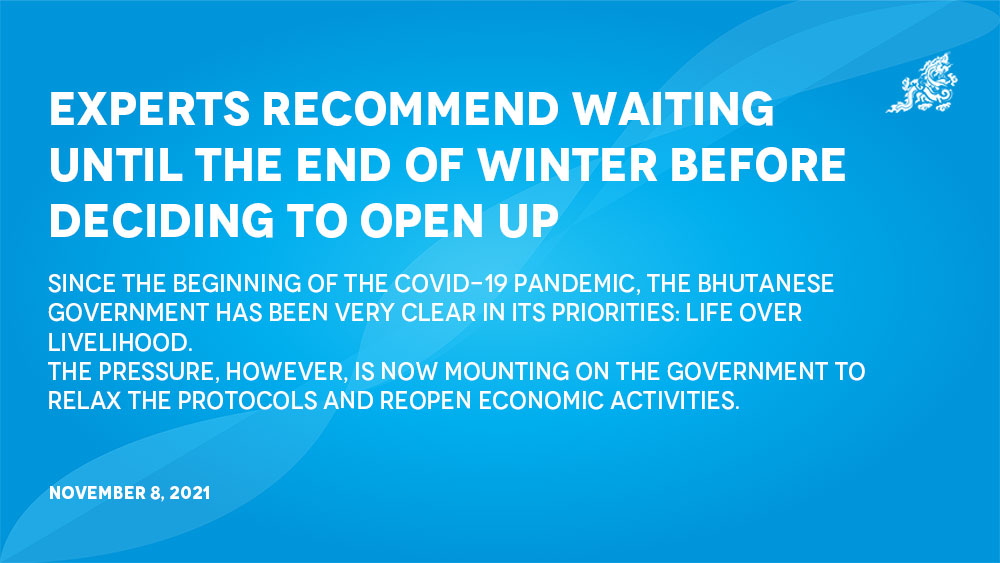Younten Tshedup
Since the beginning of the Covid-19 pandemic, the Bhutanese government has been very clear in its priorities: life over livelihood.
The pressure, however, is now mounting on the government to relax the protocols and reopen economic activities.
The pressure is mainly fuelled by the wide-reaching vaccination campaigns.
According to officials from the National Immunisation Technical Advisory Team (NI-TAG), more than 76 percent of the eligible population in the country have been fully vaccinated as of yesterday.
NI-TAG member, Dr Sonam Wangchuk, said that the coverage of more than 70 percent should be able to disrupt the transmission of the virus in a community. “So, as of now, the threat for Bhutan is minimal.”
The cost of reopening
Dr Sonam Wangchuk said that all decisions that have been taken so far, including the ones on the relaxations, have been in line with the Covid-19 protocols. “Things are relaxed in places where the risk is minimal, but restrictions continue to be imposed in places where it is necessary.”
However, he said that it would still be too early to lift all restrictions without considering the risk the pandemic continues to pose to the global community. “Covid-19 is still a pandemic and it continues to kill people across the world. While we have managed to contain it effectively so far, it doesn’t mean we are safe from the virus.”
He said that the biggest risk for the country is from neighbouring India.
“Winter in India is associated with several festivals that encourage large gatherings. Moreover, it is flu season in the northern hemisphere and there are ideal conditions for the influenza virus to be transmitted amongst people. The SARS-CoV-2 virus is also a type of influenza virus.”
The World Health Organisation’s (WHO) regional director for Europe, Dr Hans Henri P Kluge, has warned that the continent was once again at the epicentre of the Covid-19 resurgence. “The current pace of transmission across the 53 countries of the WHO European region is of grave concern.”
He said that if Europe continued to follow the current infection trajectory, Europe and Central Asia will see another half a million Covid-19 deaths by the first of February next year. He said that the surge in new cases and deaths due to the pandemic was because of the rapid relaxation of public health and social measures.
WHO country representative, Dr Rui Paulo de Jesus, said that although Bhutan has achieved good vaccine coverage, vaccines did not provide full or 100 percent protection. “Even after taking all the recommended doses and waiting for a few weeks for immunity to build up, there is a chance that someone could fall ill, especially if they do not follow other protective measures.”
However, he said that even if a person gets infected following the vaccination, he or she would be more likely to suffer minimal symptoms or only mild illness, which was one of the advantages of getting vaccinated. “Vaccines are lifesaving but not on their own. They are not enough. The use of masks, physical distancing, hand hygiene, and improved ventilation of indoor spaces remain key to reducing transmission of SARS CoV-2.”
Dr Rui said that Bhutan should adjust its response strategies by monitoring the epidemiological situation, assessing the vulnerabilities, including their health system capacity, as well as considering the adherence to and attributable impact of individual and combined public health and social measures.
“If all these measures are put in place, and, based on the country Covid-19 situation, the government can decide accordingly on reopening of the economy and other restrictions,” he said. He added that if the country lets its guards down, Covid-19 would spread silently in the community, leading to a surge in cases impacting the socio-economic development of the country.
Dr Sonam Wangchuk said that because there was no community infection within Bhutan, epidemiologically the only possible way of introducing the virus, as it has always been, was from abroad. “Therefore, before we make any major decision on reopening or easing other protocols, I suggest we wait and observe this winter.”
He added that any spike in cases in India this winter could have a significant bearing on Bhutan. “If we are not careful, there will be spill-over cases and we could have multiple community cases like in the past.”
Edited by Tashi Dema


